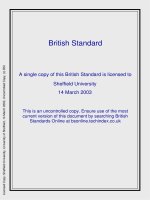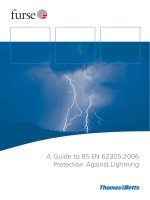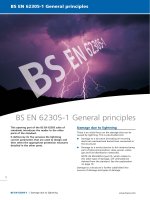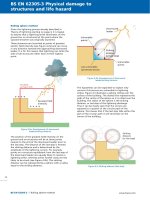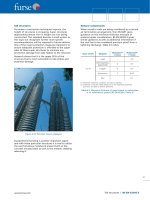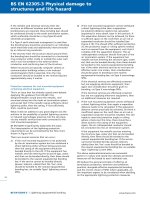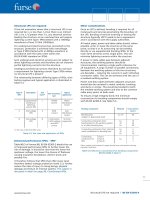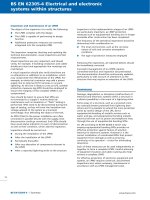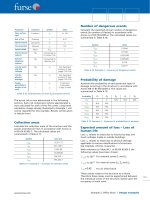Bsi bs en 00426 1993 (2010)
Bạn đang xem bản rút gọn của tài liệu. Xem và tải ngay bản đầy đủ của tài liệu tại đây (312.09 KB, 10 trang )
BRITISH STANDARD
BS EN
426:1993
Resilient floor
coverings —
Determination of
width, length,
straightness and
flatness of sheet
material
The European Standard EN 426:1993 has the status of a
British Standard
Confirmed
October 201 0
BS EN 426:1993
Cooperating organizations
The European Committee for Standardization (CEN), under whose supervision
this European Standard was prepared, comprises the national standards
organizations of the following countries:
Austria
Belgium
Denmark
Finland
France
Germany
Greece
Iceland
Ireland
Italy
Luxembourg
Netherlands
Norway
Portugal
Spain
Sweden
Switzerland
United Kingdom
Oesterreichisches Normungsinstitut
Institut belge de normalisation
Dansk Standardiseringsraad
Suomen Standardisoimisliito, r.y.
Association franỗaise de normalisation
Deutsches Institut fỹr Normung e.V.
Hellenic Organization for Standardization
Technological Institute of Iceland
National Standards Authority of Ireland
Ente Nazionale Italiano di Unificazione
Inspection du Travail et des Mines
Nederlands Normalisatie-instituut
Norges Standardiseringsforbund
Instituto Portugs da Qualidade
Asociación Espola de Normalización y Certificación
Standardiseringskommissionen i Sverige
Association suisse de normalisation
British Standards Institution
This British Standard, having
been prepared under the
direction of the Plastics and
Rubber Standards Policy
Committee, was published
under the authority of the
Standards Board and comes
into effect on
15 November 1993
Amendments issued since publication
© BSI 08-1999
Amd. No.
The following BSI references
relate to the work on this
standard:
Committee reference PRM/60
Draft for comment 90/49164 DC
ISBN 0 580 21693 4
Date
Comments
BS EN 426:1993
Contents
Cooperating organizations
National foreword
Foreword
1
Scope
2
Definition
3
Principle
4
Apparatus
5
Sampling
6
Conditioning
7
Procedure
8
Expression of results
9
Test report
Figure 1 — Measurement using string line
National annex NA (informative) Committees responsible
© BSI 08-1999
Page
Inside front cover
ii
2
3
3
3
3
3
3
3
3
4
3
Inside back cover
i
BS EN 426:1993
National foreword
This British Standard has been prepared under the direction of the Plastics and
Rubber Standards Policy Committee and is the English language version of
EN 426 Resilient floor coverings — Determination of width, length, straightness
and flatness of sheet material, published by the European Committee for
Standardization (CEN).
EN 426 was produced as a result of discussions in which the United Kingdom took
an active part.
There is no existing British Standard corresponding to EN 426.
A British Standard does not purport to include all the necessary provisions of a
contract. Users of British Standards are responsible for their correct application.
Compliance with a British Standard does not of itself confer immunity
from legal obligations.
Summary of pages
This document comprises a front cover, an inside front cover, pages i and ii,
the EN title page, pages 2 to 4, an inside back cover and a back cover.
This standard has been updated (see copyright date) and may have had
amendments incorporated. This will be indicated in the amendment table on the
inside front cover.
ii
© BSI 08-1999
EN 426
EUROPEAN STANDARD
NORME EUROPÉENNE
EUROPÄISCHE NORM
September 1993
UDC 698.7:692.535.6:645.13:620.1:531.7
Descriptors: Floor coverings, textile floor coverings, determination, dimensions, width, length, flatness, straightness
English version
Resilient floor coverings — Determination of width,
length, straightness and flatness of sheet material
Revêtements de sol resilients —
Détermination de la largeur, de la longeur,
de la rectitude et de la planéité des lés
Elastische Bodenbeläge — Bestimmung von
Breite, Länge, Geradheit und Ebenheit von
Bahnen
This European Standard was approved by CEN on 1993-08-30. CEN members
are bound to comply with the CEN/CENELEC Internal Regulations which
stipulate the conditions for giving this European Standard the status of a
national standard without any alteration.
Up-to-date lists and bibliographical references concerning such national
standards may be obtained on application to the Central Secretariat or to any
CEN member.
This European Standard exists in three official versions (English, French,
German). A version in any other language made by translation under the
responsibility of a CEN member into its own language and notified to the
Central Secretariat has the same status as the official versions.
CEN members are the national standards bodies of Austria, Belgium,
Denmark, Finland, France, Germany, Greece, Iceland, Ireland, Italy,
Luxembourg, Netherlands, Norway, Portugal, Spain, Sweden, Switzerland and
United Kingdom.
CEN
European Committee for Standardization
Comité Européen de Normalisation
Europäisches Komitee für Normung
Central Secretariat: rue de Stassart 36, B-1050 Brussels
© 1993 Copyright reserved to CEN members
Ref. No. EN 426:1993 E
EN 426:1993
Foreword
This European Standard was prepared by
CEN/TC 134, Resilient and textile floor coverings,
the secretariat of which is held by BSI.
This European Standard shall be given the status of
a national standard, either by publication of an
identical text or by endorsement, at the latest by
March 1994, and conflicting national standards
shall be withdrawn at the latest by March 1994.
The standard was approved and in accordance with
the CEN/CENELEC Internal Regulations, the
following countries are bound to implement this
European Standard: Austria, Belgium, Denmark,
Finland, France, Germany, Greece, Iceland,
Ireland, Italy, Luxembourg, Netherlands, Norway,
Portugal, Spain, Sweden, Switzerland,
United Kingdom.
2
© BSI 08-1999
EN 426:1993
1 Scope
This European Standard specifies methods for
determining the width, length, straightness and
flatness of resilient floor coverings in sheet form.
2 Definition
For the purposes of this standard, the following
definition applies.
2.1
effective width
the width bounded by two straight lines parallel to
the axis of the resilient floor covering between which
the appearance of the material is uniform and its
thickness is constant
3 Principle
The measurement at several points of the width and
length of a test piece resting on a flat surface is
carried out.
7.2.2 If the table is shorter than the length of the
roll, take the measurements part by part.
Unroll as far as possible and follow the procedure
described in 7.2.1 . Mark the points to which the
length was measured, roll up the measured length,
unroll the next part and repeat the procedure as
often as necessary to measure the full length.
7.2.3 If the roll is much longer than the table,
measure the length of the roll by re-rolling using a
device with a calibrated measuring wheel.
7.3 Assessment of straightness and flatness
7.3.1 Straightness
For a measured length of 5 m to 10 m, measure the
straightness of an edge against a string line. Record
the greatest deviation and the reference length
(see Figure 1).
7.3.2 Flatness
Check the surface and edges of the test piece for
ridges, folds or other deformations.
4 Apparatus
4.1 A rule or semi-rigid tape, accurate to 2 mm, used
for measuring width.
4.2 A table or flat surface of greater width and, if
possible, of greater length than the test piece to be
measured.
4.3 A device for measuring the length of the sheet to
an accuracy of 0,1 %, e.g. a calibrated measuring
wheel, steel tape.
4.4 String line, length 10 m.
5 Sampling
Use the entire roll if both length and width are to be
determined.
If only width is to be determined, the test piece shall
be of approximate length 200 mm.
6 Conditioning
Condition the unrolled test piece at ambient
temperature for a minimum of 4 h. Take the
measurements at ambient temperature.
7 Procedure
7.1 Measurement of width
Place the test piece on the table, with the surface
layer uppermost. Measure the effective width at
three positions.
7.2 Measurement of length
7.2.1 Lay out the test piece completely flat with the
surface layer uppermost. Measure the length in two
places parallel to the axis of the test piece
approximately 200 mm from the edges.
© BSI 08-1999
Figure 1 — Measurement using string line
8 Expression of results
Calculate the effective width of the test piece as the
smallest of the three measurements. Round off to
the nearest 5 mm and express the result in
millimetres.
Calculate the mean value of the two recorded
lengths. Round off to the nearest 0,05 m and express
the result in metres.
Express the results of the greatest deviation from
straightness to the nearest 5 mm.
3
EN 426:1993
9 Test report
The test report shall contain the following
information:
a) a reference to this standard, i.e. EN 426;
b) a complete identification of the product tested,
including type, source, colour and manufacturer’s
reference numbers;
c) previous history of the sample;
d) the effective width, in millimetres;
e) the mean value of length, in metres;
f) the value of straightness, in millimetres;
g) the assessment of flatness;
h) the temperature at which the test was carried
out;
i) any deviation from this standard which may
have affected the results.
4
© BSI 08-1999
BS EN 426:1993
National annex NA (informative)
Committees responsible
The United Kingdom participation in the preparation of this European Standard was entrusted by the
Plastics and Rubber Standards Policy Committee (PRM/-) to Technical Committee PRM/60, upon which the
following bodies were represented:
British Adhesives and Sealants Association
British Board of Agrément
British Floor Covering Manufacturers’ Association
British Railways Board
British Rubber Manufacturers’ Association Ltd.
Consumer Policy Committee of BSI
Contract Flooring Association
Cork Industry Federation
Department of the Environment (Building Research Establishment)
Federation of Plastering and Drywall Contractors
Health Care Supplies South West
Royal Institute of British Architects
© BSI 08-1999
BS EN
426:1993
BSI — British Standards Institution
BSI is the independent national body responsible for preparing
British Standards. It presents the UK view on standards in Europe and at the
international level. It is incorporated by Royal Charter.
Revisions
British Standards are updated by amendment or revision. Users of
British Standards should make sure that they possess the latest amendments or
editions.
It is the constant aim of BSI to improve the quality of our products and services.
We would be grateful if anyone finding an inaccuracy or ambiguity while using
this British Standard would inform the Secretary of the technical committee
responsible, the identity of which can be found on the inside front cover.
Tel: 020 8996 9000. Fax: 020 8996 7400.
BSI offers members an individual updating service called PLUS which ensures
that subscribers automatically receive the latest editions of standards.
Buying standards
Orders for all BSI, international and foreign standards publications should be
addressed to Customer Services. Tel: 020 8996 9001. Fax: 020 8996 7001.
In response to orders for international standards, it is BSI policy to supply the
BSI implementation of those that have been published as British Standards,
unless otherwise requested.
Information on standards
BSI provides a wide range of information on national, European and
international standards through its Library and its Technical Help to Exporters
Service. Various BSI electronic information services are also available which give
details on all its products and services. Contact the Information Centre.
Tel: 020 8996 7111. Fax: 020 8996 7048.
Subscribing members of BSI are kept up to date with standards developments
and receive substantial discounts on the purchase price of standards. For details
of these and other benefits contact Membership Administration.
Tel: 020 8996 7002. Fax: 020 8996 7001.
Copyright
Copyright subsists in all BSI publications. BSI also holds the copyright, in the
UK, of the publications of the internationalstandardization bodies. Except as
permitted under the Copyright, Designs and Patents Act 1988 no extract may be
reproduced, stored in a retrieval system or transmitted in any form or by any
means – electronic, photocopying, recording or otherwise – without prior written
permission from BSI.
This does not preclude the free use, in the course of implementing the standard,
of necessary details such as symbols, and size, type or grade designations. If these
details are to be used for any other purpose than implementation then the prior
written permission of BSI must be obtained.
BSI
389 Chiswick High Road
London
W4 4AL
If permission is granted, the terms may include royalty payments or a licensing
agreement. Details and advice can be obtained from the Copyright Manager.
Tel: 020 8996 7070.
